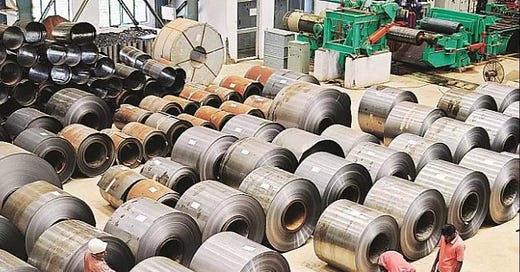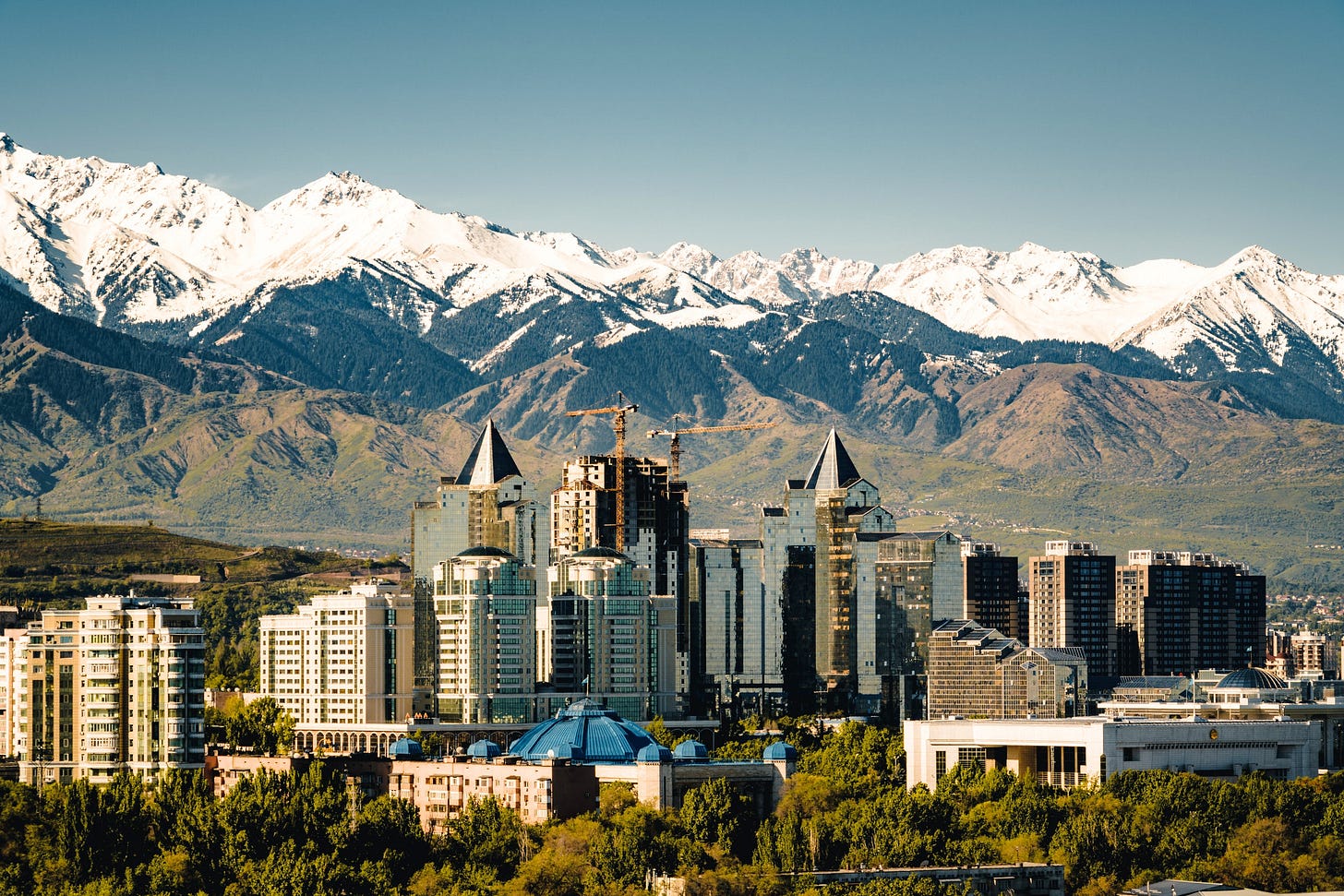Emerging Markets Daily - March 30
Record-High Steel Prices Hit Renewables, Citigroup Sells India Retail Biz, Kazakh Oil Woes, Casablanca is Top Africa Financial Center, Dubai Attracts Global Crypto Players
The Top 5 Stories Shaping Emerging Markets from Global Media - March 30
Record-High Steel Prices Threaten Renewable Energy World
Morning Brew
“Russia’s invasion of Ukraine has roiled the oil and gas markets, and it could soon impact the renewable energy world, too.”
“Along with the historic surge in the cost of other key climate-tech materials, like nickel, steel prices have hit record highs. The cause? Supply constraints and soaring energy costs resulting from the war in Ukraine.”
“Steel is essential to building out clean-energy tech. Electric vehicles, wind turbines, solar panels, geothermal and hydrogen plants—they all require significant amounts of the metal. Wind turbines, for example, are more than 70% steel.”
“The higher prices could slow the push for renewables in the near term, especially as the world turns its attention to more immediate priorities, like the war and the risks it poses to food and fuel supplies.”
“…The price per ton for steel in Europe rose above $1,500 on Friday, March 18, as the EU agreed to ban imports of Russian steel, and traders braced for the impact. Russia is the world’s third-largest exporter of steel, and the EU’s decision is expected to affect about $3.6 billion worth of products.”
“Steel and iron—which is used to make steel—are by far the most commonly used metals, accounting for 95% of all the metal produced globally each year. Demand for iron and steel has more than tripled since 1970 and is expected to continue to rise.”
“…Compounding the problem of Russian supply is that steel is itself extremely carbon-intensive to produce, meaning as fuel prices rise, so does the production cost of the metal. Even before the sanctions, European steelmakers were cutting back production due to higher energy prices following the invasion of Ukraine.”
“The iron and steel industry is the largest consumer of coal (after electricity generation) and the biggest emitter of greenhouse gasses among heavy industries, producing at least 7%–9% of global greenhouse-gas emissions.” Grace Donnelly reports.
Citigroup to Sell Indian Retail Business to Axis Bank for $1.6 Billion
Financial Times
”Citigroup has agreed to sell its Indian retail business to local lender Axis Bank for $1.6bn as Jane Fraser, the US bank’s chief executive, drives a wider withdrawal from underperforming retail markets.”
“The cash deal includes Citi’s credit cards, retail banking, wealth management and consumer loans in the country and will see 3,600 staff in India taken on by Axis, in a bet on a crowded sector already abandoned by a number of international lenders.”
“…Fraser announced that Citi was putting subscale consumer businesses in 13 countries up for sale shortly after taking over as chief executive in March 2021, after years of internal contention over the far-flung retail network’s persistently low returns.”
“The pullback, which affects markets including India, China and Poland, was designed to free up capital to be redeployed in other sections such as wealth management and institutional banking.”
“Citi plans to focus its wealth management business through hubs in Singapore, Hong Kong, the United Arab Emirates and London…In January, Citi announced a retreat from consumer and small- and medium-sized business banking in Mexico, which it mostly conducts via its Banamex subsidiary.”
“Other markets have proved more difficult to exit. Citi has struggled to find a buyer for its Russian business since last summer. Moscow’s invasion of Ukraine last month makes that sale even more unlikely. India has proved to be a challenging consumer market for international banks, with competition for market share from fintech entrants, state banks and both public and private Indian lenders.” The FT reports.
Kazakhstan Braces For Oil Output Trouble
Eurasianet
“Kazakhstan is poised to cut back oil production by around one-fifth in April while repairs are carried out on a loading terminal at a damaged Black Sea port in Russia.”
“The Energy Ministry said on March 29 that daily oil output will be pegged back by 320,000 barrels, equivalent to around 50,000 tons. Last year, Kazakhstan produced 85.7 million tons of oil.”
“Although energy market observers are bound to link the cutback to the loading terminal incident, Kazakh officials are selling this development as a planned measure to bring the country in compliance with OPEC commitments.”
“Kazakhstan has been generally bullish about the potential economic fallout of trouble at the Russian Black Sea port of Novorossiysk, which is where the pipeline that the country uses to export the bulk of its oil has its terminus. On March 22, the Caspian Pipeline Consortium, or CPC, a part-Russian-owned company, said in a statement that two of three tanker loading facilities at the port had been rendered inoperable and could take weeks to repair.”
“At a press conference on March 25, Energy Minister Bolat Akchulakov said that Kazakhstan’s largest oil field, Kashagan, would continue production as usual and that a slowdown was only envisioned in the event of repair works on the buoy mooring devices at Novorossiysk taking longer than expected.”
“…Oil production at Tengiz, a field operated by Chevron-led Tengizchevroil, on March 27 stood at 423,000 barrels, down 37 percent from the daily average over the first three weeks of the month. At Karachaganak, another field, which is operated by Karachaganak Petroleum Operating, production on the same day was recorded at 250,000 barrels, 11 percent down on the daily average earlier in the month. Kashagan, however, has retained relatively stable output.” Eurasianet reports.
Casablanca Leads Africa in Global Financial Centers Index
North Africa Post
“Morocco’s Casablanca Finance City topped the continental ranking in the financial centres index, holding the 54th spot globally out of 119, according to a recent report released this March by Long Finance & Financial Centre Futures.
“Casablanca continues to be the leading African financial centre, while Cape Town and Johannesburg continue to improve their ranking to challenge for the leading African position, said the report.”
“In the Middle East and Africa region, Dubai and Abu Dhabi take first and second places, both improving in the ranking slightly, as they did in GFCI 30, followed by Casablanca in 3rd position.”
“Overall, the majority of centres in the region fell in the rankings. New York retained its first place in this new financial index, while London, in the second place, ‘fell back in the ratings to give New York a clear lead,’ said the report.”
“Hong Kong ranked 3rd, Shanghai 4th, and Los Angeles 5th while Shenzhen returned to the top ten in the index, replacing Paris, which fell to 11th place. Meanwhile, Singapore and San Francisco moved out of the top five places in GFCI 31.”
“The ratings of most of the leading centres were relatively stable, only changing by a few points, the report said.” North Africa Post reports.
Biggest Crypto Exchange Braces for Competition in Its Dubai Hub
Bloomberg
“Binance Holdings Ltd. expects some of its top competitors to set up headquarters in its unofficial home jurisdiction of Dubai, drawn by the sun-splashed emirate’s crypto-friendly policies.”
“Changpeng ‘CZ’ Zhao, the firm’s co-founder and chief executive officer, said in an interview that at least five other exchanges are applying for licenses in Dubai, following recent approvals for Binance and the Bahamian exchange FTX.”
“‘Binance has the magnet effect in the industry,’ said Zhao, declining to name the other firms. ‘Wherever we go, the industry players do tend to follow.’ Binance, the world’s largest crypto exchange by trading volume, plans to establish regional headquarters in Europe, Latin America, Africa and Southeast Asia, according to Zhao. He said Dubai, where the company is currently hosting Binance Blockchain Week, is by ‘any common interpretation’ the firm’s HQ.
“‘I think Dubai will be a base for me for the foreseeable future but it’s not to say I’ll spend 100% of my time in Dubai,’ Zhao said.” Ben Bartenstein reports.
“Don’t quit. Suffer now and live the rest of your life as a champion.”
—Muhammad Ali





